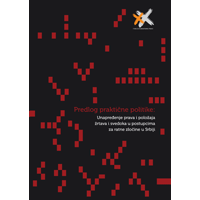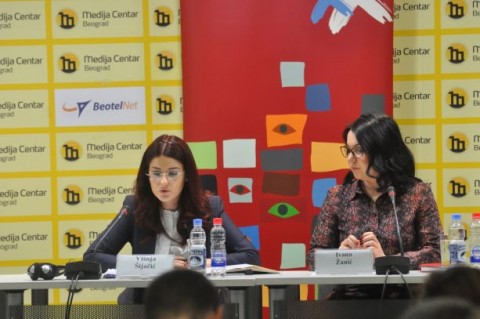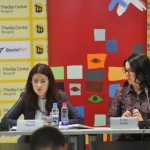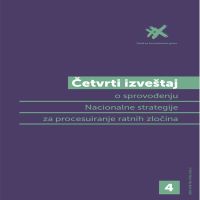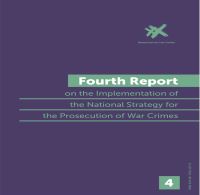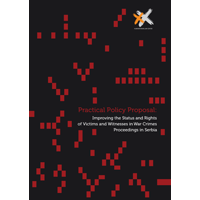
 The role of victims in war crimes proceedings is irreplaceable, as their testimonies in these proceedings are often the key evidence that can support the allegations in the indictment. In order to ensure a smooth and efficient trial, it is crucial that victims have the support of the institutions responsible for prosecution, and that they are informed about court proceedings and their rights, so that their testimony is of as high a quality as possible, but the consequences for them in life afterwards as minimal as possible. The attitude of the competent judicial authorities towards victims greatly affects their decision to participate in criminal proceedings, as well as their sense of confidence in the judicial system. In view of the fact that giving testimony is very traumatic for many victims, it is vital that the judicial system recognises the needs and concerns of the victims and provides them with the support and necessary information to reduce re-traumatisation and, at the same time, prepare them for quality testimony.
The role of victims in war crimes proceedings is irreplaceable, as their testimonies in these proceedings are often the key evidence that can support the allegations in the indictment. In order to ensure a smooth and efficient trial, it is crucial that victims have the support of the institutions responsible for prosecution, and that they are informed about court proceedings and their rights, so that their testimony is of as high a quality as possible, but the consequences for them in life afterwards as minimal as possible. The attitude of the competent judicial authorities towards victims greatly affects their decision to participate in criminal proceedings, as well as their sense of confidence in the judicial system. In view of the fact that giving testimony is very traumatic for many victims, it is vital that the judicial system recognises the needs and concerns of the victims and provides them with the support and necessary information to reduce re-traumatisation and, at the same time, prepare them for quality testimony.
Over the past 16 years, since the establishment and operation of the War Crimes Department of the Higher Court in Belgrade, the Humanitarian Law Centre (HLC) has identified a number of deficiencies in the victim and witness support system in war crimes proceedings. Some of the shortcomings are: an inadequate normative framework governing the status of victims and witnesses; the insufficient capacities of the institutions in charge of assistance and support to victims and witnesses during all stages of criminal proceedings; and the insufficient training and sensitivity of employees in institutions competent for war crimes proceedings.
The Policy Paper: Improving the Status and Rights of Victims and Witnesses in War Crimes Proceedings in Serbia analyses the legal and institutional framework governing the rights of victims and witnesses, and identifies existing problems regarding the status of victims and witnesses, with the aim of proposing recommendations to the institutions of Serbia responsible for war crimes prosecutions for improving the conditions under which victims testify during criminal proceedings before the courts in Serbia.
The Policy Paper is available here.
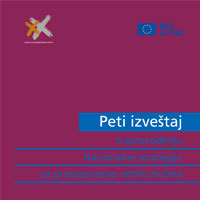
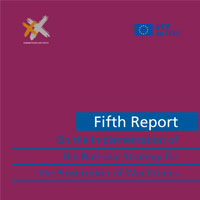 The Humanitarian Law Center (HLC) has been monitoring and providing support to war crimes trials ever since the first war crimes proceedings conducted in Serbia in 2002. The HLC is the only organization that has been continuously monitoring and analyzing war crimes trials in Serbia and informing the public at home and abroad about them. The HLC has been filing criminal complaints against suspected perpetrators with the Office of the War Crimes Prosecutors (OWCP), and it has also been identifying witnesses and victims and encouraging them to give evidence in court, and thus contribute to achieving justice for past crimes.
The Humanitarian Law Center (HLC) has been monitoring and providing support to war crimes trials ever since the first war crimes proceedings conducted in Serbia in 2002. The HLC is the only organization that has been continuously monitoring and analyzing war crimes trials in Serbia and informing the public at home and abroad about them. The HLC has been filing criminal complaints against suspected perpetrators with the Office of the War Crimes Prosecutors (OWCP), and it has also been identifying witnesses and victims and encouraging them to give evidence in court, and thus contribute to achieving justice for past crimes.






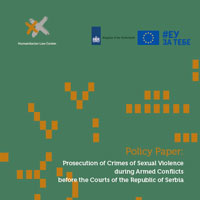 In 1991 and 1992, while conflict took place in Bosnia and Herzegovina (BiH), the international community was interested in allegations by the media and non-governmental organisations that sexual violence was frequently committed. As a result, certain domestic and international organisations, began investigating those media allegations, and the UN Security Council formed the Panel of Experts, with the aim of determining whether sexual violence was strategically used as a weapon of war. The report submitted by the Panel of Experts influenced the establishment of the ICTY in 1993 and the creation of a new legal framework dealing with sexual violence.
In 1991 and 1992, while conflict took place in Bosnia and Herzegovina (BiH), the international community was interested in allegations by the media and non-governmental organisations that sexual violence was frequently committed. As a result, certain domestic and international organisations, began investigating those media allegations, and the UN Security Council formed the Panel of Experts, with the aim of determining whether sexual violence was strategically used as a weapon of war. The report submitted by the Panel of Experts influenced the establishment of the ICTY in 1993 and the creation of a new legal framework dealing with sexual violence.
 On Monday, December 23, 2019, at 12:00 the Humanitarian Law Center (HLC) will present its Fifth Report on the Implementation of the National Strategy for the Prosecution of War Crimes and the Policy Paper: Prosecution of Crimes of Sexual Violence during Armed Conflicts before the Courts of the Republic of Serbia. The presentation will take place in the Main Conference Hall of the Media Centre in Belgrade (Terazije 3, 2nd floor).
On Monday, December 23, 2019, at 12:00 the Humanitarian Law Center (HLC) will present its Fifth Report on the Implementation of the National Strategy for the Prosecution of War Crimes and the Policy Paper: Prosecution of Crimes of Sexual Violence during Armed Conflicts before the Courts of the Republic of Serbia. The presentation will take place in the Main Conference Hall of the Media Centre in Belgrade (Terazije 3, 2nd floor).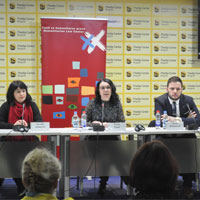
 On Friday, 6th December 2019, the Humanitarian Law Center (HLC) presented its “
On Friday, 6th December 2019, the Humanitarian Law Center (HLC) presented its “
 The role of victims in war crimes proceedings is irreplaceable, as their testimonies in these proceedings are often the key evidence that can support the allegations in the indictment. In order to ensure a smooth and efficient trial, it is crucial that victims have the support of the institutions responsible for prosecution, and that they are informed about court proceedings and their rights, so that their testimony is of as high a quality as possible, but the consequences for them in life afterwards as minimal as possible. The attitude of the competent judicial authorities towards victims greatly affects their decision to participate in criminal proceedings, as well as their sense of confidence in the judicial system. In view of the fact that giving testimony is very traumatic for many victims, it is vital that the judicial system recognises the needs and concerns of the victims and provides them with the support and necessary information to reduce re-traumatisation and, at the same time, prepare them for quality testimony.
The role of victims in war crimes proceedings is irreplaceable, as their testimonies in these proceedings are often the key evidence that can support the allegations in the indictment. In order to ensure a smooth and efficient trial, it is crucial that victims have the support of the institutions responsible for prosecution, and that they are informed about court proceedings and their rights, so that their testimony is of as high a quality as possible, but the consequences for them in life afterwards as minimal as possible. The attitude of the competent judicial authorities towards victims greatly affects their decision to participate in criminal proceedings, as well as their sense of confidence in the judicial system. In view of the fact that giving testimony is very traumatic for many victims, it is vital that the judicial system recognises the needs and concerns of the victims and provides them with the support and necessary information to reduce re-traumatisation and, at the same time, prepare them for quality testimony.